Message From Our President

Dear Students, Faculty, Staff and Friends,
I am pleased to present to you this Guide to our plans for the upcoming fall semester and reopening of our campuses. In form and in content, this coming semester will be like no other. We will live differently, work differently and learn differently. But in its very difference rests its enormous power.
The mission of Yeshiva University is to enrich the moral, intellectual and spiritual development of each of our students, empowering them with the knowledge and abilities to become people of impact and leaders of tomorrow. Next year’s studies will be especially instrumental in shaping the course of our students’ lives. Character is formed and developed in times of deep adversity. This is the kind of teachable moment that Yeshiva University was made for. As such, we have developed an educational plan for next year that features a high-quality student experience and prioritizes personal growth during this Coronavirus era. Our students will be able to work through the difficulties, issues and opportunities posed by our COVID-19 era with our stellar rabbis and faculty, as well as their close friends and peers at Yeshiva.
To develop our plans for the fall, we have convened a Scenario Planning Task Force made up of representatives across the major areas of our campus. Their planning has been guided by the latest medical information, government directives, direct input from our rabbis, faculty and students, and best practices from industry and university leaders across the country. I am deeply thankful to our task force members and all who supported them for their tireless work in addressing the myriad details involved in bringing students back to campus and restarting our educational enterprise.
In concert with the recommendations from our task force, I am announcing today that our fall semester will reflect a hybrid model. It will allow many students to return in a careful way by incorporating online and virtual learning with on-campus classroom instruction. It also enables students who prefer to not be on campus to have a rich student experience by continuing their studies online and benefitting from a full range of online student services and extracurricular programs.
In bringing our students back to campus, safety is our first priority. Many aspects of campus life will change for this coming semester. Gatherings will be limited, larger courses will move completely online. Throughout campus everyone will need to adhere to our medical guidelines, including social distancing, wearing facemasks, and our testing and contact tracing policies. Due to our focus on minimizing risk, our undergraduate students will begin the first few weeks of the fall semester online and move onto the campus after the Jewish holidays. This schedule will limit the amount of back and forth travel for our students by concentrating the on-campus component of the fall semester to one consecutive segment.
Throughout our planning, we have used the analogy of a dimmer switch. Reopening our campuses will not be a simple binary, like an on/off light switch, but more like a dimmer in which we have the flexibility to scale backwards and forwards to properly respond as the health situation evolves. It is very possible that some plans could change, depending upon the progression of the virus and/or applicable state and local government guidance.
Before our semester begins, we will provide more updates reflecting our most current guidance. Please check our website, yu.edu/fall2020 for regular updates. We understand that even after reading through this guide, you might have many additional questions, so we will be posting an extensive FAQ section online as well. Additionally, we will also be holding community calls for faculty, students, staff and parents over the next couple of months.
Planning for the future during this moment has certainly been humbling. This Coronavirus has reminded us time and time again of the lessons from our Jewish tradition that we are not in full control of our circumstances. But our tradition also teaches us that we are in control of our response to our circumstances. Next semester will present significant challenges and changes. There will be some compromises and minor inconveniences--not every issue has a perfect solution. But faith and fortitude, mutual cooperation and resilience are essential life lessons that are accentuated during this period. And if we all commit to respond with graciousness, kindness, and love, we can transform new campus realities into profound life lessons for our future.
Deeply rooted in our Jewish values and forward focused in preparing for the careers and competencies of the future, we journey together with you, our Yeshiva University community, through these uncharted waters. Next year will be a formative year in the lives of our students, and together we will rise to the moment so that our students will emerge stronger and better prepared to be leaders of the world of tomorrow.
Best Wishes,
Ari Berman

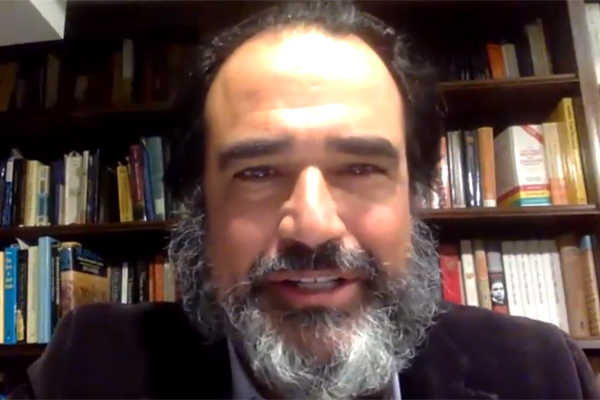 Dr. Ronnie Perelis moderates the panel discussion on the war in Ukraine.
Dr. Ronnie Perelis moderates the panel discussion on the war in Ukraine.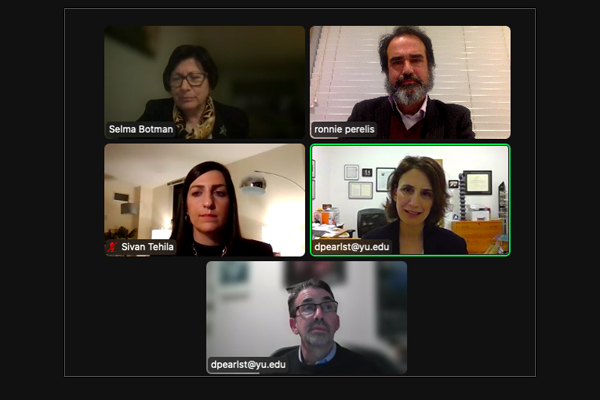 Dr. Perelis began the proceedings with an acknowledgement that “the shock and horror we experienced when we gathered last week has only become darker” but that events like these discussions, designed “to help us come together in search of insight and understanding and wisdom,” gave us the tools “to battle helplessness and to fight against apathy, to better understand the situation and see how we can help.”
Dr. Botman echoed Dr. Perelis’ sentiments, saying that “our hearts go out to the Ukrainians for the death and pain and destruction that they are experiencing” but also noting that the kinds of expertise represented on the panel “demonstrate the depth of the knowledge of our faculty” and their ability to “step up and help us understand this crisis.”
Each panelist then gave a quick summation of the most salient points about the economic, legal and technological challenges created by Russia’s invasion of Ukraine.
Dr. Kahn gave listeners a quick but thorough primer about the instruments available to policymakers during a time of conflict to inflict economic damage on an enemy, a practice, he pointed out, “as old as war itself.” Governments can use such tools as blockade, embargo, freezing and/or appropriating assets, and excluding Russia’s financial institutions from global payment systems to cause a liquidity crisis in the Russian economy, with the intent of making the war so economically painful that Putin will pull back of his own accord or the populace will be emboldened to push for political change to achieve an end to the war.
He also acknowledged that all these tactics have their downsides, what he called “spillovers,” such as higher oil prices or a default on debts, and that there can be real damage to the global economic system if the world’s 11th largest economy has a meltdown.
His conclusion is that sanctions could have an adverse impact on Russia (which he thinks they will be able to weather) but equally possible is that they will also cause significant harm to the integrated economies of the world.
On the legal front, specifically as it concerns the identification and prosecution of war crimes, Prof. Pearlstein noted while there are distinct definitions of what constitute war crimes enshrined in a number of treaties and resolutions, there are limited means to address them, which raises the question of how possible it will be to hold combatants accountable for criminal activities once the war ends.
She cited four possibilities: Ukraine’s own justice system; countries with statutes declaring that they have universal jurisdiction authority, such as Germany (but not the United States); the International Criminal Court (though the United States, Russia and Ukraine are not parties to the ICC); and a special tribunal (such as with Yugoslavia or Rwanda).
While each of these, or a combination of them, might do the job, her concern was whether the prospect of indictment and conviction would have any deterrence effect on Russia’s actions. She did not think so, but the prospect may have an inspiring effect on those opposing Putin. She admitted that “I think the conflict is likely to get worse before it gets better in terms of violence against civilians and that the best hope we have is to leverage the tools we have to persuade the persuadables among the Russian forces to avoid a life in prison. At a minimum, it will be exceedingly difficult for any of these individuals to travel anywhere outside Russia for the foreseeable future, not just because of sanctions but because of the very real threat of criminal prosecution.”
Russia’s cyber hacking efforts have been the focus of much news reporting in the past few weeks, and Sivan Tehila admitted that “the cyber front is fascinating, even for security professionals who have been working in the field for a while.” She explained how Russia has had a history of cyber attacks against Ukraine “well before there were tanks on the ground” and that observers are now seeing cyber becoming “one of the main fronts in this war.”
She also noted that, given this history, Russia, a “hacking superpower” (she named and described the three established groups that do the Kremlin’s cyber work), has been restrained in using cyber as a weapon in Ukraine. She is sure that the Russian government has targeted critical infrastructure, such as railways, airports and health care systems, “but that, for them, it is not the right time to use them because they have other decisions to make. Deciding on when to launch a cyberattack is usually much easier when you have everything ready.”
On the Ukrainian side, “there are thousands of tech workers who are now taking active part in the cyber attacks on Russia,” though they are not as organized as their Russian counterparts, and alongside them are groups like Cyber Partisans (based in Belarus) and Anonymous, the hacker collective that has declared its own war against Russia.
There are steps that businesses and individuals can take in light of the cyber war being waged to fortify themselves, and the advice is not much different than the advice people who work with computers should always follow. Businesses should develop business continuity and disaster recovery plans in case they are hacked or attacked by ransomware. The Cybersecurity & Infrastructure Security Agency (cisa.gov) has a program called “Shields Up” to help organizations work through these challenges.
Everyone regardless should also validate all remote access and ensure that VPNs (virtual private networks) are safeguarded. Initiate multifactor authentication, do periodic backups of vital information and respond to cyber attacks in real time to deny the ability of hackers to infect systems.
The evening ended with a brief Q&A about such topics as the role of tech companies in archiving material for possible criminal prosecutions even as they remove misinformation from their platforms, whether sanctions can achieve their goal of stopping the war, the outlook for war crime prosecutions, and how contributing to one of the many humanitarian aid organizations working to alleviate suffering can balance one’s despair and anguish.
Dr. Perelis began the proceedings with an acknowledgement that “the shock and horror we experienced when we gathered last week has only become darker” but that events like these discussions, designed “to help us come together in search of insight and understanding and wisdom,” gave us the tools “to battle helplessness and to fight against apathy, to better understand the situation and see how we can help.”
Dr. Botman echoed Dr. Perelis’ sentiments, saying that “our hearts go out to the Ukrainians for the death and pain and destruction that they are experiencing” but also noting that the kinds of expertise represented on the panel “demonstrate the depth of the knowledge of our faculty” and their ability to “step up and help us understand this crisis.”
Each panelist then gave a quick summation of the most salient points about the economic, legal and technological challenges created by Russia’s invasion of Ukraine.
Dr. Kahn gave listeners a quick but thorough primer about the instruments available to policymakers during a time of conflict to inflict economic damage on an enemy, a practice, he pointed out, “as old as war itself.” Governments can use such tools as blockade, embargo, freezing and/or appropriating assets, and excluding Russia’s financial institutions from global payment systems to cause a liquidity crisis in the Russian economy, with the intent of making the war so economically painful that Putin will pull back of his own accord or the populace will be emboldened to push for political change to achieve an end to the war.
He also acknowledged that all these tactics have their downsides, what he called “spillovers,” such as higher oil prices or a default on debts, and that there can be real damage to the global economic system if the world’s 11th largest economy has a meltdown.
His conclusion is that sanctions could have an adverse impact on Russia (which he thinks they will be able to weather) but equally possible is that they will also cause significant harm to the integrated economies of the world.
On the legal front, specifically as it concerns the identification and prosecution of war crimes, Prof. Pearlstein noted while there are distinct definitions of what constitute war crimes enshrined in a number of treaties and resolutions, there are limited means to address them, which raises the question of how possible it will be to hold combatants accountable for criminal activities once the war ends.
She cited four possibilities: Ukraine’s own justice system; countries with statutes declaring that they have universal jurisdiction authority, such as Germany (but not the United States); the International Criminal Court (though the United States, Russia and Ukraine are not parties to the ICC); and a special tribunal (such as with Yugoslavia or Rwanda).
While each of these, or a combination of them, might do the job, her concern was whether the prospect of indictment and conviction would have any deterrence effect on Russia’s actions. She did not think so, but the prospect may have an inspiring effect on those opposing Putin. She admitted that “I think the conflict is likely to get worse before it gets better in terms of violence against civilians and that the best hope we have is to leverage the tools we have to persuade the persuadables among the Russian forces to avoid a life in prison. At a minimum, it will be exceedingly difficult for any of these individuals to travel anywhere outside Russia for the foreseeable future, not just because of sanctions but because of the very real threat of criminal prosecution.”
Russia’s cyber hacking efforts have been the focus of much news reporting in the past few weeks, and Sivan Tehila admitted that “the cyber front is fascinating, even for security professionals who have been working in the field for a while.” She explained how Russia has had a history of cyber attacks against Ukraine “well before there were tanks on the ground” and that observers are now seeing cyber becoming “one of the main fronts in this war.”
She also noted that, given this history, Russia, a “hacking superpower” (she named and described the three established groups that do the Kremlin’s cyber work), has been restrained in using cyber as a weapon in Ukraine. She is sure that the Russian government has targeted critical infrastructure, such as railways, airports and health care systems, “but that, for them, it is not the right time to use them because they have other decisions to make. Deciding on when to launch a cyberattack is usually much easier when you have everything ready.”
On the Ukrainian side, “there are thousands of tech workers who are now taking active part in the cyber attacks on Russia,” though they are not as organized as their Russian counterparts, and alongside them are groups like Cyber Partisans (based in Belarus) and Anonymous, the hacker collective that has declared its own war against Russia.
There are steps that businesses and individuals can take in light of the cyber war being waged to fortify themselves, and the advice is not much different than the advice people who work with computers should always follow. Businesses should develop business continuity and disaster recovery plans in case they are hacked or attacked by ransomware. The Cybersecurity & Infrastructure Security Agency (cisa.gov) has a program called “Shields Up” to help organizations work through these challenges.
Everyone regardless should also validate all remote access and ensure that VPNs (virtual private networks) are safeguarded. Initiate multifactor authentication, do periodic backups of vital information and respond to cyber attacks in real time to deny the ability of hackers to infect systems.
The evening ended with a brief Q&A about such topics as the role of tech companies in archiving material for possible criminal prosecutions even as they remove misinformation from their platforms, whether sanctions can achieve their goal of stopping the war, the outlook for war crime prosecutions, and how contributing to one of the many humanitarian aid organizations working to alleviate suffering can balance one’s despair and anguish.
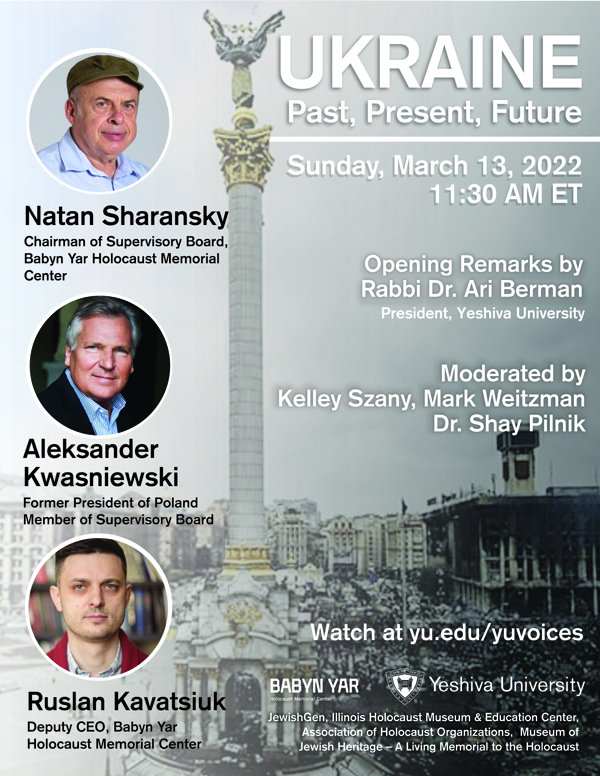 On Sunday, March 13, 2022, almost 1,200 participants had the privilege of joining a Zoom meeting with Ruslan Kavatsiuk, Deputy CEO of the Babyn Yar Holocaust Memorial Center (see their
On Sunday, March 13, 2022, almost 1,200 participants had the privilege of joining a Zoom meeting with Ruslan Kavatsiuk, Deputy CEO of the Babyn Yar Holocaust Memorial Center (see their 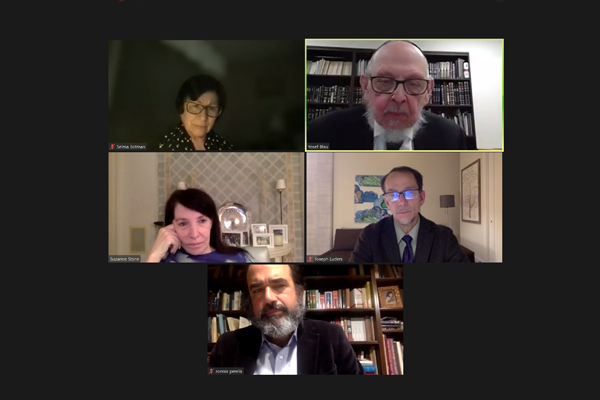 Clockwise: Dr. Selma Botman, Rabbi Yosef Blau, Dr. Joseph Luders, Dr. Ronnie Perelis, Prof. Suzanne Last Stone
Clockwise: Dr. Selma Botman, Rabbi Yosef Blau, Dr. Joseph Luders, Dr. Ronnie Perelis, Prof. Suzanne Last Stone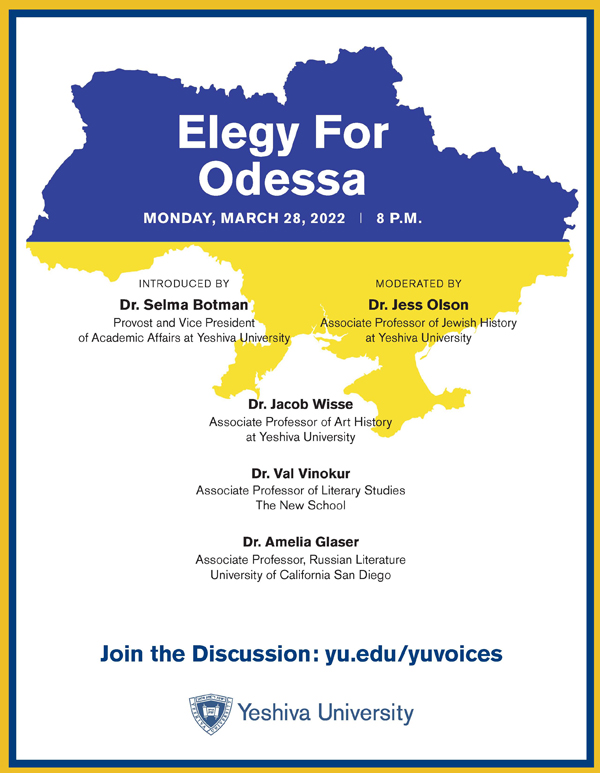 The participants who attended the panel discussion on Monday, March 28, 2022, “Elegy for Odessa,” were treated to a two-hour master class on the literature, art, history and politics provoked by the city of Odessa, both the city as geographical reality and arena of dreams, as disputed territory and the forge of Jewish identities. As Dr. Val Vinokur described it, Ukraine is, at the same same time, then and now, a literal and metaphorical breadbasket and a crossroads of armies.
As Dr. Olson so eloquently put it, “Odessa’s modernity, its vision of building an opening to the larger world, runs very deeply in the dynamics of the city. Odessa was a place for Jews of newness, of exceptionalism, a cosmopolitan city at a time when cosmopolitanism in the Russian context was still developing, a place where a new Jewish man could rise in Russia while living in a jewel of a city on the Black Sea.”
The richness of this discussion was underscored by the knowledge of the dangers it faces from the current Russian invasion, and the encomiums paid by the panelists to its many depths and beauties only strengthened the resolve of those on the panel and in the virtual audience to do what they can do to save Odessa from demolition and Ukraine from disaster.
The participants who attended the panel discussion on Monday, March 28, 2022, “Elegy for Odessa,” were treated to a two-hour master class on the literature, art, history and politics provoked by the city of Odessa, both the city as geographical reality and arena of dreams, as disputed territory and the forge of Jewish identities. As Dr. Val Vinokur described it, Ukraine is, at the same same time, then and now, a literal and metaphorical breadbasket and a crossroads of armies.
As Dr. Olson so eloquently put it, “Odessa’s modernity, its vision of building an opening to the larger world, runs very deeply in the dynamics of the city. Odessa was a place for Jews of newness, of exceptionalism, a cosmopolitan city at a time when cosmopolitanism in the Russian context was still developing, a place where a new Jewish man could rise in Russia while living in a jewel of a city on the Black Sea.”
The richness of this discussion was underscored by the knowledge of the dangers it faces from the current Russian invasion, and the encomiums paid by the panelists to its many depths and beauties only strengthened the resolve of those on the panel and in the virtual audience to do what they can do to save Odessa from demolition and Ukraine from disaster.
 The faces of Rabbi Wolff
The faces of Rabbi Wolff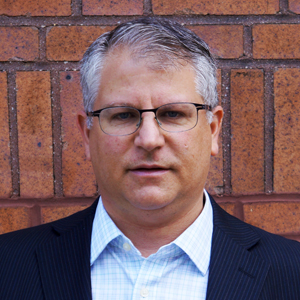 Dr. Joshua Zimmerman
Dr. Joshua Zimmerman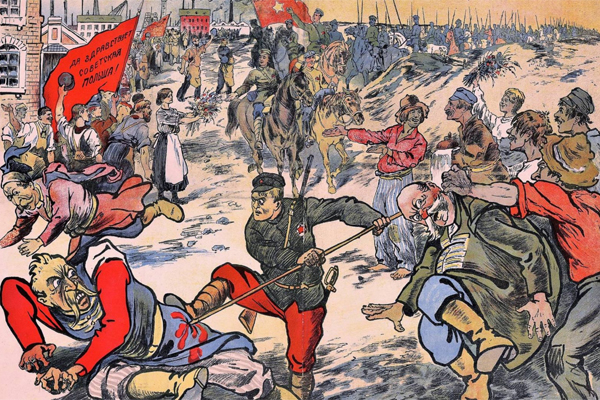 Bolshevik propaganda poster of Polish-Soviet war, 1920. Text reads: 'This is how the Polish lords' plan finishes. Long live Soviet Poland'. Credit: Stepan Mukharsky/Wikipedia Commons
Bolshevik propaganda poster of Polish-Soviet war, 1920. Text reads: 'This is how the Polish lords' plan finishes. Long live Soviet Poland'. Credit: Stepan Mukharsky/Wikipedia Commons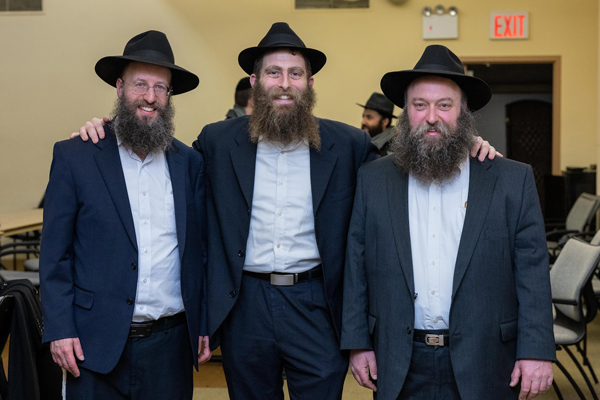 (l-r): Chaim Levinson, Herschel Hartz, Levi Raices
(l-r): Chaim Levinson, Herschel Hartz, Levi Raices